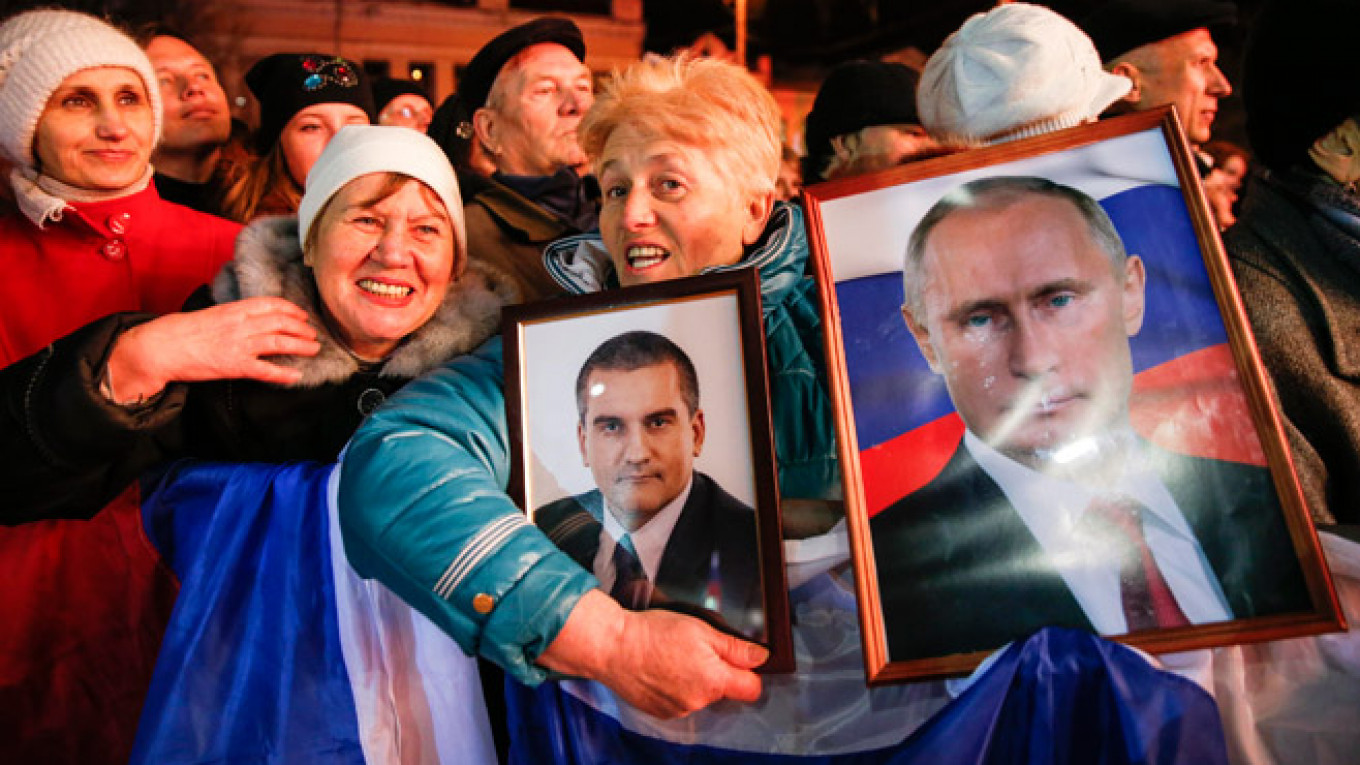This week marks the one-year anniversary of Russia's annexation of Crimea. To note the occasion, the U.S. State Department announced on Monday, "We do not, nor will we, recognize Russia's attempted annexation and call on President Vladimir Putin to end his country's occupation of Crimea." The State Department official statement continued, "We reaffirm that sanctions related to Crimea will remain in place as long as the occupation continues."
The Russians appear even more unmovable on the Crimea question. In his 2014 state of the nation speech in December, Putin framed Crimea as a cradle of Russian Christianity and of "sacral importance." Military analysts are quick to point out that the naval base in Sevastopol, home to Russia's Black Sea Fleet, is a key strategic asset as well.
Putin has also invested tremendous political capital into standing firm against Western indignation over his bold and unexpected decision to annex Crimea. After the annexation, Putin's approval rating spiked to around 85 percent and has held steady ever since, according to the Levada Center.
In a documentary aired by state television to celebrate the anniversary, Putin even said that he had been ready to put Russia's nuclear arsenal on alert to secure his policy course in Crimea. Meanwhile, Crimea has been integrated into the Russia Federation over the last year, from the installation of new political, economic and legal structures to the switching of the peninsula's very time zone.
In short, there appears to be no realistic scenario in which the current political leadership in Russia would ever return Crimea to Ukraine, and little reason to think that any foreseeable future Kremlin leadership would do so either.
So, if Russian control of Crimea must now be considered permanent in every practical sense, does this mean that American sanctions against Russia over Crimea will remain in place indefinitely?
The current political situation in Washington suggests that the United States may be as unlikely as Moscow to give ground on the Crimea question anytime soon. Earlier this month, Democrats joined Republicans on the Senate Foreign Relations Committee in unanimously pressuring the White House to arm Ukraine. Support for Ukraine's territorial integrity enjoys solid bipartisan support.
All leading 2016 presidential hopefuls are also expected to take a tougher line with Putin than Obama has, if elected. The Obama administration's perceived weakness in punishing Russia over its actions will surely be a favorite foreign policy talking point for Republican contenders in presidential debates.
The attitude of ordinary Americans toward Russia has also noticeably cooled. A Pew center Global Attitudes poll found that, from 2013 to 2014, the percentage of Americans with an unfavorable view of Russia rose from 43 to 72 percent.
Perhaps the only voices opposing sanctions in Washington will be the lobbyists of energy companies and other business interests. Already hurting from the sustained drop in world oil prices, ExxonMobil will not want to lose the potential boost offered by Russia's Arctic reserves, which it has been exploring with Rosneft. These lonely holdouts seem unlikely to stem the anti-Russian tide in Washington, however.
In contemplating how long U.S. sanctions against Russia may last, it is perhaps worth remembering the story of the Jackson-Vanik amendment. This Cold War relic, signed into law in 1975, remained on the books until 2012, long outliving the issue it was designed to address, and forcing American presidents to periodically issue Moscow trade restriction waivers.
Although sanctions enacted by executive order are much easier to overturn than legislation, there is no telling whether or not these sanctions will make a run at Jackson-Vanik’s 37-year record with two sides as irrevocably entrenched on opposite sides of an issue as the U.S. and Russia are today on the status of Crimea.
Will Wright is a political analyst and journalist focused on Eurasia.
A Message from The Moscow Times:
Dear readers,
We are facing unprecedented challenges. Russia's Prosecutor General's Office has designated The Moscow Times as an "undesirable" organization, criminalizing our work and putting our staff at risk of prosecution. This follows our earlier unjust labeling as a "foreign agent."
These actions are direct attempts to silence independent journalism in Russia. The authorities claim our work "discredits the decisions of the Russian leadership." We see things differently: we strive to provide accurate, unbiased reporting on Russia.
We, the journalists of The Moscow Times, refuse to be silenced. But to continue our work, we need your help.
Your support, no matter how small, makes a world of difference. If you can, please support us monthly starting from just $2. It's quick to set up, and every contribution makes a significant impact.
By supporting The Moscow Times, you're defending open, independent journalism in the face of repression. Thank you for standing with us.
Remind me later.






